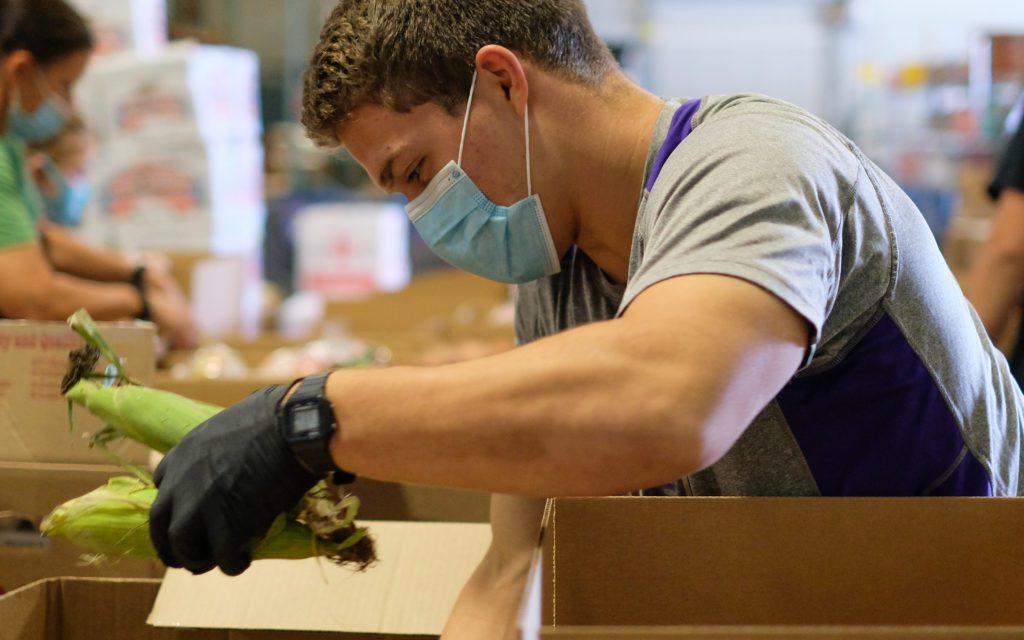
South Michigan Food Bank provides the fresh food boxes for a new Food Bank Council of Michigan “food pharmacy” initiative. Photo courtesy of South Michigan Food Bank.
Your seasonal allergies are bad this year. You’re sneezing, congested, eyes are prickly—the whole nine yards. What do you do? Well, you probably go to your doctor, she gives you a prescription for allergy medication, and you’re good as new.
But wait, let’s back up. Let’s add an empty stomach on top of your sneezy symptoms. You’re in a tough spot financially and having trouble putting food on the table, or maybe you live in an area without much healthy food available nearby. At your appointment, your doctor asks if you worry that food will run out in your household—food insecurity can lead to infection, chronic disease, and mental health challenges—but if you say yes, what can she do?
A new Food Bank Council of Michigan (FBCM) initiative intends to expand a model in which the second situation is treated much like the first—where produce can be given to patients as seamlessly as medication can. It’s part of a new wave of nutrition interventions that join food access work with healthcare delivery, acknowledging the link between hunger and health.
The FBCM project, called “A Sustainable Food Pharmacy Model for Michigan,” isn’t the only initiative of this kind we’re supporting in 2020. District Health Department #10 is providing nutrition education and vouchers for produce in clinics and hospitals throughout northwest Michigan. Spectrum Health Foundation is expanding their Family Kitchen Rx program to teach the power of nutrition to diverse communities in Kent County. And Michigan State University is examining the impacts of pediatric produce prescriptions on children at pediatric clinics in Flint.
These “food as medicine” efforts vary in geography and method, but they have common visions of equitable food access. And while their work is rooted in their own communities, their eyes are set on wider implementation, a Michigan in which nutrition management, access to affordable, healthy food, and clinical care go hand in hand.
According to FBCM, a significant barrier to achieving that dream is twofold: they need to acquire sustainable funding, and they need to accrue the necessary data to prove their work deserves that funding. Here’s how they described that challenge:
We are not the first to explore adding fresh and healthy food prescriptions in a health care clinic. The real challenge lies in that most of these food prescriptions rely on philanthropic dollars to support, and most are unable to be evaluated for payer or policy purposes because there is no closed-loop clinical referral to the food program. What this means is that food-as-medicine programs for low-income patients are reliant on community-based organizations to support outside of the clinic, creating difficulties for data sharing (Did the patient get the food?) and patient follow-up (Did the patient eat the food? Was there behavioral change over time? Can we connect the behavioral change to health outcomes?)
At the Health Fund, we are always looking for innovative work that has long-term potential. Our partnerships do the most good when we can provide the springboard, supporting the initial work that can close loops and build connections, helping our grant partners build the evidence necessary to turn exciting pilots into permanent solutions for Michigan residents.
Through a partnership with South Michigan Food Bank, FBCM will be providing fresh food boxes and nutrition education to 350 patients at Grace Health in Battle Creek, including children, expectant mothers, and older adults managing chronic conditions. After six months, the organization will be able to analyze patient health outcomes, such as blood pressure and blood sugar levels, as well as financial data to determine the return of investments for the clinic. Ultimately, the goal is to use this information to make the business case for food prescription programs and the policy changes that would bring them sustained funding.
Our recent contract with the Michigan Farmers Market Association (MIFMA) is building the same case. In partnership with Public Sector Consultants, MIFMA is offering technical assistance to produce prescription program implementers while assembling key lessons learned and cost-savings data, demonstrating that these programs not only benefit the health of Michigan residents but also reduce Medicaid costs and support local farmers. Hunger, nutrition, health, economic stability—it’s an interconnected web, and by strengthening one, we can strengthen them all.
Like our grant partners, we envision a Michigan in which nutritious food options are readily available to all: young or old, rich or poor, living in Detroit or Ironwood.
Last month, we released the Michigan Food Environment Scan, a report that both highlights what makes a successful program and identifies some of the critical food access gaps in Michigan. An effort to guide our future grantmaking, the report names six common themes of successful food interventions: youth engagement, partnerships, scalability and replicability, tailoring to the local community, increasing food access, and economic benefit.
All of these themes are crucial to FBCM’s work. But beyond these characteristics, it’s the coexistence of immediate community benefits along with long-term statewide potential that really make it (and programs like it) special.
For more about food security in Michigan and how we’re working to address it, read the Michigan Food Environment Scan.
